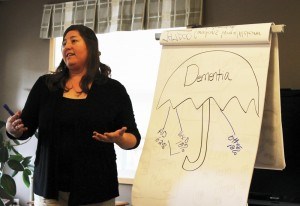
At a recent presentation about Alzheimer’s and other dementias several seniors from the Alpine Summit Seniors Lodge expressed disappointment about the lack of resources that are available in Jasper to cope with the disease.
“We don’t really have anything,” said Janet Barker. “Sometimes I feel so alone because I’m watching all my friends struggle—there are people in here that I’ve known for 50 years and they have no idea who I am anymore.
“It can be really upsetting.”
Barker said she would like to see some sort of support group put in place to help seniors deal with issues like dementia.
“What we really need is a full-time seniors outreach worker,” Barker said.
Barker noted that a few years ago the lodge had access to a seniors outreach worker, but that only lasted for about 18 months, she said.
“You can’t do that,” Barker said. “You can’t just give us someone and then take her away. We need someone full-time.”
Beth LeBlanc, manager of Community Outreach Services confirmed that there had been a worker for the seniors in the past, but was unavailable for further comment.
Alpine Summit Seniors Lodge assistant manager, Julie Des Becquets, said while she appreciates the seniors’ concerns it’s difficult to find someone who is properly trained to help those struggling with the affects of dementia.
“As far as I know there aren’t any nurses in Alberta Health who are trained for daily assisted living for people with dementia,” Des Becquets said. “It’s really tough.”
According to Alberta Health Services, Albertans can receive specialized dementia advice through a service called Health Link. This service helps support individuals and caregivers living with dementia. The program, which started in September 2015, serves people in the south, central and north zones of AHS.
By dialing 811, callers will reach Health Link staff who can assess their needs and provide immediate advice for their concerns. Callers can also be referred to a specialized dementia nurse for additional support.
The issue was brought up during a presentation about dementia hosted by the Alzheimer Society of Alberta and the Northwest Territories, June 9. After hearing the seniors’ concerns, society representative Shayna Bowling said she would be willing to work with the lodge to help seniors’ cope with issues like dementia.
“Now that we know there is a need here we can start moving forward to accommodate that,” said Bowling, adding other community groups should also get involved.
Aside from promising to help the seniors, Bowling’s presentation also offered some insight about the differences between dementia and Alzheimer’s.
According to Bowling, Alzheimer’s is actually just a different form of dementia, which happens to make up 62 per cent of dementias. Another common dementia is vascular dementia, which causes stroke-like symptoms and hallucinations.
“When we look at dementia we want to look at it as if it were an umbrella term,” Bowling said.
Crunching the numbers, Bowling said 747,000 Canadians are living with some form of dementia—40,000 of those being Albertans.
“The first thing that we start to lose is our short term memory ... things start to get confusing pretty quick,” Bowling said.
Most dementias are broken down into three stages. In the early stage memory loss becomes noticeable to the person with the disease and to those around them. Complex tasks such as balancing bank accounts and keeping up with social activities may start to become challenging. In the middle stage a person’s ability to perform daily living activities decline substantially while in the final stage a person will eventually become unable to communicate verbally or walk independently.
While there still isn’t a cure for dementia, Bowling said there are numerous things to help ease the stresses associated with the disease. She said the most important thing is to be patient.
“We live in an immediate society where we want answers now. If they sense you’re being impatient that will often stress someone out—they get embarrassed or feel stupid that they can’t answer quickly,” Bowling said.
Another thing that helps is to stop correcting someone with dementia. Often someone with dementia will confuse their answers to simple questions. Bowling used the example of asking someone what they had for breakfast.
“If they say they had a hot fudge sundae even though you know they had toast then just don’t question it,” she said. “If you sit there and argue then their whole perception of reality is skewed.”
There are also several types of medication that can help ease the disease, however, this is only temporary said Bowling.
Other tips for helping someone with the disease is to use visuals like family photos and use their names when discussing people and ask them their opinion on things.
“Someone might forget what they did 20 minutes ago but they still have an opinion,” Bowling said. “If you asked someone if they like blue or red they are still able speak their mind.”
For more information visit
Kayla Byrne
[email protected]
